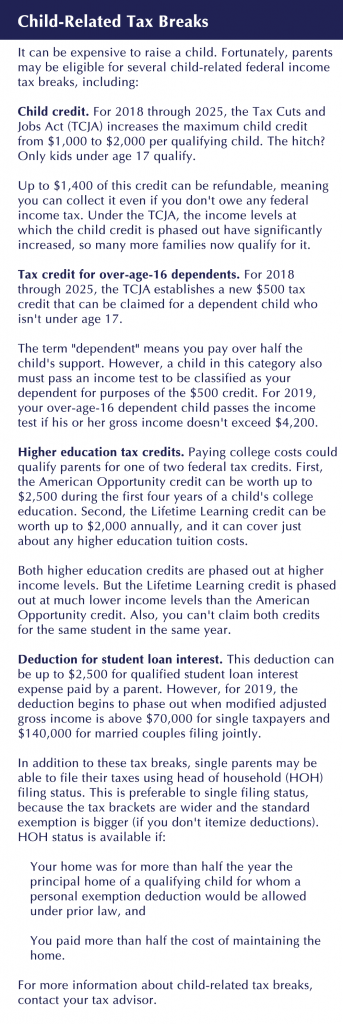Does your son or daughter work during the summer or school year? A part-time job can be a great way for your child to learn about financial responsibility. It can also teach a valuable lesson about owing taxes. In addition to explaining why the government takes money from kids’ paychecks, parents may need to help their children file their taxes by April 15.
Here are answers to common questions about the tax rules that may apply to kids.
Does My Child Need to File a Tax Return?
For 2019, your dependent child must file a federal income tax return in the following situations:
• The child has unearned income of more than $1,100. If your child has more than $2,200 of unearned income, he or she may be subject to the so-called “kiddie tax.”
• The child’s gross income exceeds the greater of 1) $1,100, or 2) earned income up to $11,850 plus $350.
• The child’s earned income exceeds $12,200.
• The child owes other taxes, such as the self-employment tax or the alternative minimum tax (AMT).
Even if your child isn’t required to file a tax return, one should be filed if federal income tax was withheld for any reason and would be refunded if a return is filed. It’s also necessary to take advantage of certain beneficial tax elections, such as the election to currently report accrued U.S. Savings Bond income that would be sheltered by your child’s standard deduction.
Who’s Responsible for Filing My Child’s Return?
A child is generally responsible for filing his or her own tax return and for paying any tax, penalties and interest. If a child can’t file his or her own return for any reason, the child’s parent, guardian or other legally responsible person must file it on the child’s behalf.
If the child can’t sign the return, a parent or guardian must sign the child’s name followed by the words “By (signature), parent or guardian for minor child.” If you sign a child’s tax return, you can deal with the IRS on all matters related to the return.
In general, a parent or guardian who doesn’t sign can only provide information concerning the return and pay the child’s tax bill. The parent or guardian isn’t entitled to receive information from the IRS and can’t legally bind the child to a tax liability arising from the return.
Can I Report My Child’s Income on My Tax Return?
For a given tax year, parents can choose to report their children’s income on their tax return if:
• The child will be under age 19 (or under age 24 if a full-time student) as of December 31, and
• All of the child’s income is from interest and dividends, including mutual fund capital gains distributions and Alaska Permanent Fund dividends.
So, kids with income from working part-time jobs don’t qualify. Your tax professional can tell you if this option is allowable and advisable in your specific family situation.
What’s the Kiddie Tax?
For 2018 through 2025, the Tax Cuts and Jobs Act (TCJA) revamped the kiddie tax rules. Under the TCJA, a portion of the kid’s (or young adult’s) unearned income is taxed at the higher rates paid by trusts and estates. Those rates can be as high as 37% and as high as 20% for long-term capital gains and dividends.
Under prior law, the kiddie tax rate equaled the parent’s marginal rate. For 2017, a parent’s marginal rate could have been as high as 39.6% or 20% for long-term capital gains and dividends.
Follow these steps to calculate your child’s taxable income:
1. Add the child’s net earned income and net unearned income.
2. Subtract the child’s standard deduction.
The portion of taxable income that consists of net earned income is taxed at the regular rates for a single taxpayer. The portion of taxable income that consists of net unearned income and that exceeds the unearned income threshold ($2,200 for 2019) is subject to the kiddie tax. This amount is taxed at the higher rates that apply to trusts and estates.
Unearned income for purposes of the kiddie tax means income other than wages, salaries, professional fees and other amounts received as compensation for personal services. Some examples of unearned income are capital gains, dividends and interest. Earned income from a job or self-employment is never subject to the kiddie tax.
Important: For a given tax year, any child (or young adult) who meets the following conditions must file Form 8615, “Tax for Certain Children Who Have Unearned Income”
• The child has more than $2,200 of unearned income (for 2019).
• He or she is required to file Form 1040.
• He or she is 1) under age 18 as of December 31, 2) age 18 as of December 31 and didn’t have earned income in excess of half of his or her support or 3) between ages 19 and 23 as of December 31 and a full-time student and didn’t have earned income in excess of half of his or her support.
• He or she has at least one living parent as of December 31.
• He or she doesn’t file a joint return for the year.
Where can I find more information?
The rules for kids can be complicated in certain situations, especially when the kiddie tax comes into play. Call us at 434.296.2156 or email us at info@hwllp.cpa if you have additional questions about the tax consequences of working a part-time job or reporting unearned income from investments, as well as potential tax-saving opportunities that come with parenthood.

© 2024 CPA Site Solutions.
Disclaimer of Liability
Our firm provides the information in this article for general guidance only, and does not constitute the provision of legal advice, tax advice, accounting services, investment advice or professional consulting of any kind. The information provided herein should not be used as a substitute for consultation with professional tax, accounting, legal or other competent advisors. Before making any decision or taking any action, you should consult a professional advisor who has been provided with all pertinent facts relevant to your particular situation. Tax articles in this blog are not intended to be used, and cannot be used by any taxpayer, for the purpose of avoiding accuracy-related penalties that may be imposed on the taxpayer. The information is provided “as is,” with no assurance or guarantee of completeness, accuracy or timeliness of the information, and without warranty of any kind, express or implied, including but not limited to warranties of performance, merchantability and fitness for a particular purpose.
Blog
Nonprofit Insights

